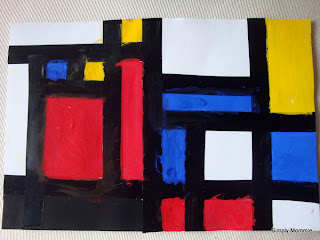The Perfect Square tells the story of a square who made the best of whatever happened to him and eventually found great contentment being the square that he was. A wonderful read for not just children, but adults as well, a reminder that no matter what happens to us, we make the best of the situation and find our own happiness as the square did eventually at the end of the story.
Now here's what we did for this interesting book - not as comprehensive as my
other posts on literature-based learning though! :)
We tried to replicate the story to see if we could re-create the square in those ways in the book.
We did this activity over a few days as it requires quite a bit of time and stamina.
Using a piece of drawing block, I cut out 6 squares and got her to paint them in the colours the square appeared on the book.
 |
| We used water colours so that we could get a softer feel and blend of colours |
For younger children, this would be a good time to teach colours apart from just doing the painting.
 |
| Completed squares in the process of drying |
 |
| The squarish book and our paintings |
 |
| Using the hole puncher for the first time |
 |
| Arranging her shapes she cut out from her square to form the picture in the book |
 |
| Done! |
 |
| More fine motor skills involved - tearing the square into pieces |
 |
| drawing in the details found in the book |
 |
| Fill in the missing words with the stickers provided |
 |
| Pasting in the missing words |
 |
| Our completed version |
Vocabulary
These are the words/ phrases I found that needed some explaining/ revision:
'shattered', 'babbled', 'torn into scraps' vs 'shredded in strips', 'ripped', 'crumpled', 'wrinkled', 'confining', 'rigid', 'cramped'
Extension activity:
Piet Mondrian-inspired art:
 |
| I pasted black tape on half a sheet of drawing block, set up the colours that Piet Mondrian used in his famous work, and got her to view examples of Piet Mondrian art on the tablet, leaving a sample next to her so that she could focus on her task. |
 |
| Painting squares and rectangles |
 |
| The completed piece of art which is now the cover of her A4-sized scrapbook where I stick the pictures and paintings she does in school and at home. |
Other ideas that you can tap on after reading the book (for younger children):
- Days of the week - you can re-read The Hungry Caterpillar by Eric Carle as well for reinforcement
- Colours
- Shapes
- Story sequencing - ask the child what happened to the square on the various days and what the square became as a result.
Hope you have fun!


















Love it! Thanks for sharing. I will definitely have a look into the title :D
ReplyDeleteYou're welcome Beanienus! :)
Delete